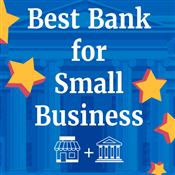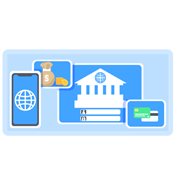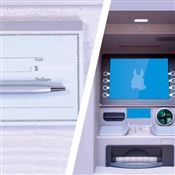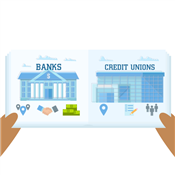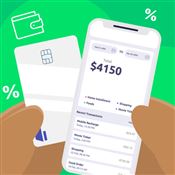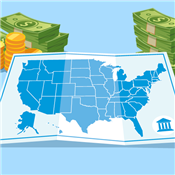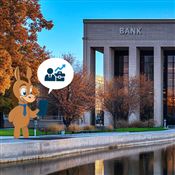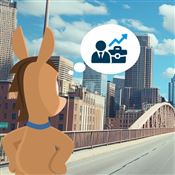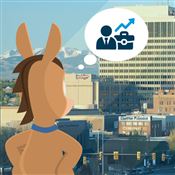Best Alternatives to Traditional Banks
Traditional banks aren't the right fit for everyone. But what other options do you have? Find out in this detailed breakdown of alternatives to banks.
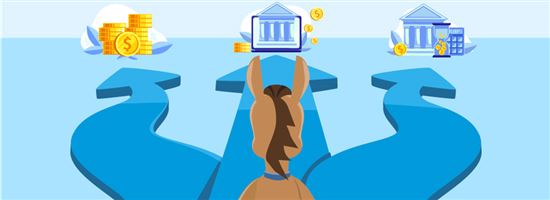 |
Build Credit While You Bank
- Get Paid Up to 2 Days Faster
- Build credit and earn points with every swipe
- 40,000 fee-free Allpoint ATMs in the U.S.
- No credit check, minimum balance or hidden fees
Pros:
| Cons:
|
Our Review: ![]()
![]()
![]()
![]()
![]()
Rewards Checking - Up to 3.30% APY
- Build your own APY with up to 3.30% APY*
- Zero monthly maintenance fees
- Zero overdraft or NSF fees
- Zero minimum monthly balance reqs
- No initial deposit requirement
- Unlimited domestic ATM fee reimbursements
- Online debit card management
- Simple, 3-step process for direct deposit
Many of us feel the greed of big banks. The costly overdraft fees, the minimum balance requirements, the low APYs.
You have to wonder: isn't there a better option?
Luckily, there are some solid alternatives out there. There are other types of financial companies offering innovative solutions to manage your money. So if you're ready to ditch the traditional bank, read on.
Plus, find out your best alternatives for savings accounts to maximize returns.
Best Alternatives to Traditional Banks
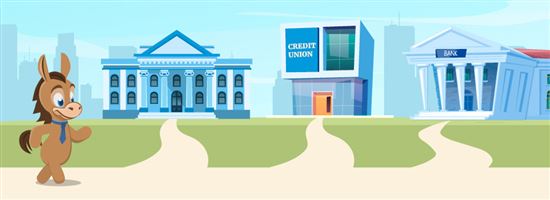 |
Choosing the right financial institution is an important decision. You want one that aligns with your values, caters to your demographic, and offers the services you need.
Read about your best non-bank options below, and consider carefully which best suits your individual needs before making a decision.
1. Credit Unions
Credit unions offer many of the same services as traditional banks, such as checking and savings accounts. The difference is their business model: they aim to prioritize the credit union's customers, rather than their shareholders.
They put service over profit, which many would say is the exact opposite of most banks.
Unlike banks, credit unions are member-owned and member-controlled financial institutions. Benefitting the members of the credit union benefits the credit union itself, since they are one in the same.
Because of this model, credit unions tend to offer higher interest rates on their savings accounts, and lower rates on home and auto loans.
However, there are still some downsides to credit unions.
First, credit unions typically have strict requirements to join. In most cases, you must either live or work in a specific geographical region, or you must belong to a specific demographic or profession.
Second, credit unions tend to offer fewer services than banks do. Plus, they can be slower to adopt new technologies that would make banking more convenient to customers.
|
|
Your money is protected by the National Credit Union Administration (NCUA). Just like the FDIC, it insures your deposits up to $250,000.
2. Online Banks
Online banks are on the rise, and there's good reason for it.
Without physical branches, online banks save a lot of money on rent, upkeep, and staffing. And rather than pocketing that extra cash, they pass the savings on to the consumer.
Typically, online banks offer a smaller selection of the same traditional banking services, such as checking, savings, and business accounts. However, they often come with better interest rates.
For example, Ally Bank, a well-known online bank, might offer as much as 3.30% APY on their savings account.
To compare, rates at Bank of America may be as low as 0.01%, even for "premium" accounts.
The downside of using an online bank is, of course, lack of physical access. You can't visit a physical branch if you need to. Depending on the bank, ATM access may also be more limited. However, many online banks join ATM networks such as Allpoint, which has over 55,000 ATM machines around the world.
|
|
CIT Bank Platinum Savings - 3.75% APY
- 3.75% APY with a balance of $5,000 or more
- 0.25% APY with a balance of less than $5,000
- $100 minimum opening deposit
- No monthly maintenance fee
- Member FDIC
3. Neobanks
Neobanks may sound like something out of a science fiction film. In reality, they're technology companies that offer financial services, often in partnership with more traditional banks.
By focusing on technology first, neobanks are designed for customers who plan to do most of their banking on mobile devices or online.
Many of them offer higher interest rates on savings as well. They also tend to have tools to help with budgeting and money management.
Some popular examples of neobanks include SoFi, Chime, and Current.
|
|
Current Savings - Up to 4.00% bonus
- 4.00% bonus on up to $6,000 balance if you receive and maintain a qualifying direct deposit of $200 or more in a rolling 35 day period. (Otherwise, 0.25%)
- Simply add money to your Savings Pods and enable the Boost feature.
- Earn bonus on up to 3 Savings Pods, up to $2,000 balance each.
- Bonuses accumulate daily.
4. Cash Management Accounts
Cash management accounts (CMAs) are typically offered by brokerage firms or investment apps.
CMAs offer many features similar to checking accounts. You'll get a debit card for purchases and even checkbooks. You can set up direct deposit, pay bills, and deposit checks from the app. They usually have large ATM networks so withdrawing cash is easy.
Since they're often connected to an investment account, they may also have options to automatically invest your extra cash.
An example is the Wealthfront Cash Account. It has no monthly fees and even gives an impressive 4.00% APY. Fidelity and Betterment are other popular options.
You don't have to use the investment service in order to open a cash management account.
|
|
5. Community Banks
If you'd rather bank in person and develop a personal relationship with your banker, check out your local community bank.
Community banks are smaller banks, (with $50 billion or less in assets[1]), and, as the name suggests, will only serve a specific geographical region. They're common in rural areas, but they can be found in cities too.
Because of their small size and limited scope, community banks tend to be more in-tune with the unique needs of the people and businesses in their region.
Community banks need to enable the people and businesses around them to thrive. It is a symbiotic relationship that allows the bank to continue operating and benefits the local community. With better knowledge of the local economy, they're more likely to take it into account when making lending decisions.
They may also offer better interest rates than their larger competitors.
The downside of using a community bank is that they may be slower to adopt new technologies, though some of them have gone on to offer online banking.
They may also be less convenient, with fewer branches and ATMs. Furthermore, they may not offer some of the services that big banks do, such as investing.
|
|
6. Payment Services
Payment services, like PayPal, Venmo, and Cash App, can replace a traditional bank account if you only need the basics. You don't need a bank account to sign up.
Once you have your account, you can add money to your balance by setting up direct deposit with your work. It's also easy to send and receive money from family and friends who also use the app.
PayPal and Cash App even let you add cash at popular retail stores. You just give your cash to the cashier and have them scan your app to load it.
Just like a normal checking account, you can get a debit card, pay bills, and deposit checks with the app.
|
|
7. Reloadable Prepaid Debit Cards
If you want to avoid banks altogether, a prepaid debit card could be a great choice. You can get one with Visa or Mastercard.
A prepaid debit card is not tied to a bank account. You preload money onto it, and can only spend what you have on the card. If you load $1,000, then you'll have a $1,000 limit to spend.
Prepaid cards let you do a lot of the same things that checking account do. Such as:
- Make purchases in stores and online
- Receive paycheck direct deposits
- Pay bills online
- Withdraw money from ATMs
- Add cash at ATMs or retailers
- Make mobile check deposits
You can manage your prepaid card account entirely online. But there are some things you can't do (like write checks). Another con is that prepaid cards often charge fees for things like adding money and paying bills.
This could be an option if you've had past banking mistakes, and don't qualify for a traditional checking account. They don't look at your banking history.
|
|
Top Recommendations for Banking Alternatives
Here are some banking alternative solutions if you're looking to ditch the traditional bank.
High Interest Checking - Up to 1.10% APY
- Earn up to 1.10% APY
- $100 minimum opening deposit
- APY is based on the account balance and making at least 10 qualifying debit card point-of-sale transactions of $10.00 or more per statement cycle.
Best Alternatives to Big Bank Savings Accounts
You may have noticed that APYs on traditional savings accounts are abysmal. With the current inflation rate, putting your money away can lose you precious dollars every day. But what are you going to do?
Here, we'll highlight some of your best, low-risk options for getting higher returns on your savings.
Online Savings Accounts
As we discussed above, online banks save on a lot of overhead and operational costs that brick-and-mortar banks are required to deal with.
They pass much of those savings on to the consumer, offering far more attractive rates to compete in the financial marketplace.
In addition to higher rates, online savings accounts usually have less fees and minimum balance requirements.
High Yield Savings - 3.50% APY
- 3.50% APY
- $100 minimum opening deposit
- No monthly service fees
Certificates of Deposit
A Certificate of Deposit, or simply "CD," is a type of savings account that requires you to deposit a certain amount of money for a set length of time.
In exchange for tying up your funds for a certain time, CDs often pay better interest rates than regular savings accounts. Once again, online banks will usually pay higher APYs.
To get around your money being locked up, savvy savers often deposit their savings into multiple CDs, set to expire at different times. That way, if they need cash, it's never too far out of reach. This technique is known as CD laddering.
Money Market Mutual Fund
A money market fund is a type of extremely conservative mutual fund. It invests in short-term cash equivalent securities, like US Treasury, CDs, and commercial papers.
The returns are not very high, but they are still better than traditional bank savings rates. The advantage is that they are very low-risk investments, while providing some dividends and liquidity.
You can withdraw your investment at any time without penalty.
Peer to Peer Lending Platforms
Peer to peer (P2P) platforms let you invest in loans to people who don't want to get a traditional bank loan. You earn returns as people pay back their loans with interest.
But since it's an investment, there is risk that the borrower may default and you lose money. But you can spread the risk by investing small amounts in many loans.
Prosper is the most popular P2P lending platform. Investors have averaged 5.7% returns, which is much better than what you'd get by parking money in a bank.
Treasury Inflation Protected Securities (TIPS)
This is a Treasury bond that is designed to keep pace with inflation. The principal value will increase when there's inflation. It will decrease if there's deflation. However, your principal is protected and you'll always get your original investment back.
You'll also get a fixed interest rate. Plus, the interest earnings and growth of the principal are exempt from state and local income taxes.
TIPS are offered in terms of 5 years, 10 years and 30 years. You can purchase directly at TreasuryDirect.gov or through a brokerage.
Frequently Asked Questions
- Where should I put my money instead of the bank?
Online banks, neobanks, and cash management accounts are all great alternatives to traditional banks. They offer a lot of the same checking features. Plus, your money is protected.If you prefer having physical locations, your local credit union is another great option. They're more community and member-focused.
- Why shouldn't you put money in a traditional bank?
Traditional banks offer very low interest rates (if any at all). This means with inflation and rising costs of living, you're actually losing money day by day.You should keep some money in the bank for daily activities. But it's best to store your savings in an account that earns more returns.
If you're looking for better ways to save your money, consider high yield savings accounts, money market funds, or treasury bills. Those offer slightly higher returns, but are low-risk.
- Is it okay to not have a bank account?
There are many banking alternatives nowadays. So you don't have to get a traditional banking account. But some sort of money management account will be necessary to pay bills and receive paychecks.And if you need to get a loan someday, lenders often need to look at your banking history.
- Are there risks to saving my money somewhere besides a savings account?
Bank savings accounts are risk-free. The value of your funds won't go down. If you put your money in stock investments or p2p loans, there is risk that you could lose money.Plus, banks are FDIC insured. This means the federal government insures your money in case the bank fails. Depending on where you save your money, other options may not get this protection.
Bottom Line
As you can see, there are plenty of bank alternatives out there. Whether you're just looking to put big banks behind you, find better rates, or get better customer support, one of the options here will be a good pick.
Keep in mind, not every bank is right for everyone. You might even use a combination of these banks and services to suit your needs.
Now that you know all about the alternatives to traditional banks, choosing the one that's right for you should be a breeze.
References
- ^ "About Community Banking": ICBA.org, 2022.
Jeremy Harshman is a creative assistant at CreditDonkey, a bank comparison and reviews website. Write to Jeremy Harshman at jeremy.harshman@creditdonkey.com. Follow us on Twitter and Facebook for our latest posts.
Note: This website is made possible through financial relationships with some of the products and services mentioned on this site. We may receive compensation if you shop through links in our content. You do not have to use our links, but you help support CreditDonkey if you do.
|
|
| ||||||
|
|
|




